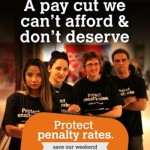Quotes from Gerard Dwyer, National Secretary the SDA the union for retail, fast food and online retail workers
For seven months, hundreds of thousands low paid frontline workers have endured a Morrison government endorsed pay cut while some company executives have been paying themselves bonuses with taxpayer money which they should not have received.
Only today a dark chapter will finally end for retail and fast food workers who have suffered a seven month pay freeze imposed by the Fair Work Commission despite serving Australians on the frontline during the worst of the pandemic.
At long last, hundreds of thousands of retail and fast food workers on the award minimum will now finally start to receive the 1.75 percent increase in their wages, lifting their pay by up to $14.20 a week (by 37.3 cents an hour to $21.78).
In July, in an unprecedented decision, the FWC delayed even this minimal increase by a full seven months on the basis of an alleged impact on employment based on what the commission acknowledged was imperfect data and which has turned out to have had no factual basis.
It should never have happened and the FWC should never allow it to happen again.
As a consequence, thousands of retail and other low paid workers who live from pay packet to pay packet have, as the FWC admits in its July decision, suffered “a decline in living standards” for the past seven months as many of them served on the frontline, making sure the rest of the community could put food on the table as well as the other essentials of life.
These unselfish workers have missed out on up to 426 dollars over the past seven months, money that could have been used, for example, to buy their children increased access to the internet at a time when they were forced by government decree to resort to remote learning. To many in the community this may seem like a small amount, but for lower paid workers living from week to week it can make a vital difference in making ends meet. In real terms, their living standards were cut.
In its submission to the Commission, the ACTU argued that “a real lift to minimum wages will help rather than hinder [the] transition” to the recovery from the COVIDO19 pandemic, an argument the FWC effectively rejected.
The data now show the ACTU was right and the representatives of business who argued for no increase were wrong.
Equally, the Morrison government was wrong to urge “caution” on the commission, the only result of which has been to make lower paid workers suffer unnecessarily.
The SDA worked hard and successfully throughout 2020 pressing companies to bring forward the increase.
Working closely with members, the SDA was able to deliver an earlier wage increase for tens of thousands of members working in companies like Woolworths, Coles supermarkets and many others.
These companies suffered no negative economic impact and in fact many experienced record sales.
But many other retailers did not pass on the modest wage increase, preferring to put money into executive bonuses and shareholder dividends without a second thought for their hardworking employees, who have been risking their health and safety to help make sure their employers continued to prosper.
Even worse, while the FWC with the endorsement of the Morrison government effectively cut the wages of lower paid workers for seven months, it will not require companies that received more than they were entitled from Jobkeeper to repay the millions of taxpayers money they pocketed.
The excuse of Treasurer Josh Frydenberg on Insiders on Sunday: “Because that was never the legislated purpose of the program.”
Not good enough.
The FWC based its decision to delay the July increase on predictions in the RBA’s May Statement of Monetary Policy which have turned out to be wildly pessimistic. For example, unemployment was predicted still to be at 9 percent in December; in fact it was down to 6.6 percent as measured by the ABS.
The RBA predicted growth would still be negative in December (minus 6 percent). In reality, the economy returned to growth much earlier than the RBA predicted and was back to 3.3 percent by year’s end.
The FWC should learn from this grievous decision which imposed a wage freeze on hundreds of thousands of low paid frontline workers. This mistake has cost thousands of workers hundreds of dollars for no good reason.
The FWC must listen more closely to the vindicated arguments of the ACTU and less to those who always think the only solution, whatever the circumstances, is to cut wages.
Never again.
Contact: Jim Middleton 0418 627 066
Comments are closed.



